Expert Garden Maintenance in Fitzrovia: Keeping Your Green Space Pristine
Introduction to Garden Maintenance in Fitzrovia
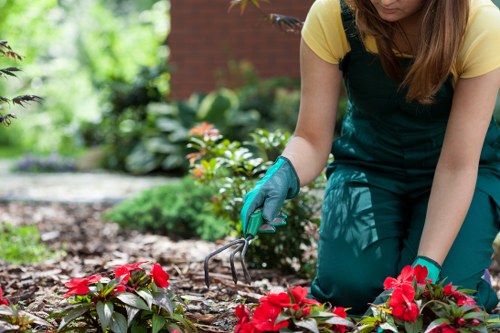
Maintaining a beautiful garden in Fitzrovia requires dedication, knowledge, and the right approach. Whether you have a sprawling backyard or a compact balcony garden, proper maintenance ensures your plants thrive and your outdoor space remains inviting.
Fitzrovia, known for its vibrant community and charming residences, offers unique gardening challenges and opportunities. From seasonal planting to pest control, understanding the specific needs of your garden can make all the difference.
In this article, we'll explore essential garden maintenance tips tailored to Fitzrovia's climate and urban environment. Whether you're a seasoned gardener or just starting, these insights will help you cultivate a lush and healthy garden all year round.
Seasonal Garden Maintenance
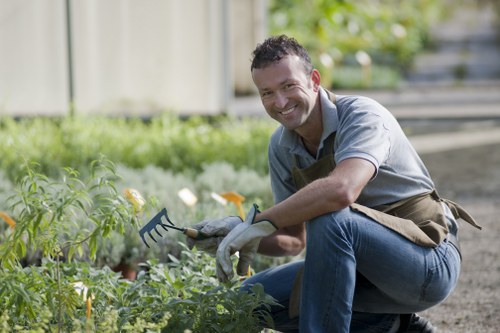
Spring Care
Spring is a critical time for garden maintenance in Fitzrovia. As the weather warms, it's the perfect opportunity to prepare your garden for the growing season.
Key spring tasks include:
- Pruning: Trim back any dead or overgrown branches to promote healthy growth.
- Soil Preparation: Enrich the soil with compost or organic matter to provide nutrients for your plants.
- Planting: Start planting early-season vegetables and flowers to take advantage of the longer days.
By addressing these tasks early, you set a strong foundation for a vibrant garden throughout the year.
Summer Maintenance Strategies
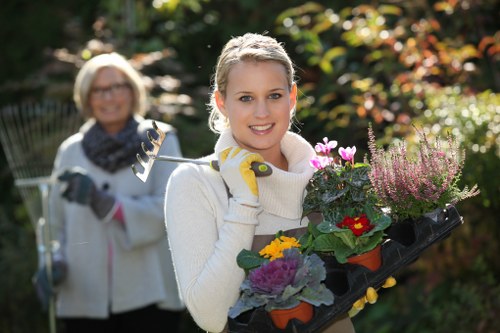
Irrigation and Watering
Summer in Fitzrovia can be both beautiful and challenging for gardeners. Adequate watering is essential to keep your plants healthy during the hot months.
Consider the following tips for effective summer watering:
- Early Morning Watering: Water your garden in the early hours to minimize evaporation and allow plants to absorb moisture before the heat of the day.
- Drip Irrigation: Utilize drip systems to deliver water directly to the plant roots, reducing water wastage.
- Mulching: Apply a layer of mulch to retain soil moisture and regulate temperature.
Implementing these strategies will help your garden withstand the summer heat and remain lush.
Autumn Garden Preparation
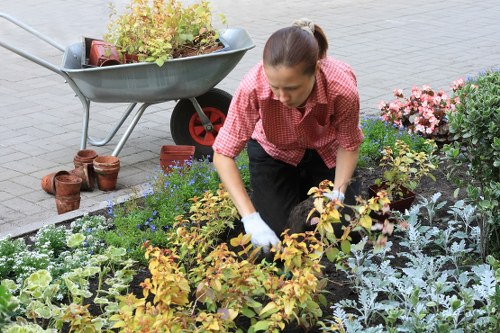
Leaf Management
As autumn arrives in Fitzrovia, it's time to prepare your garden for the cooler months. Managing fallen leaves is a key aspect of autumn garden maintenance.
Steps for effective leaf management:
- Raking: Regularly rake fallen leaves to prevent them from smothering your plants.
- Composting: Use collected leaves to create compost, enriching your soil for the next planting season.
- Mulching: Apply a layer of leaf mulch to protect plant roots from frost and improve soil structure.
Proper leaf management not only keeps your garden tidy but also contributes to its long-term health.
Winter Care for Fitzrovia Gardens
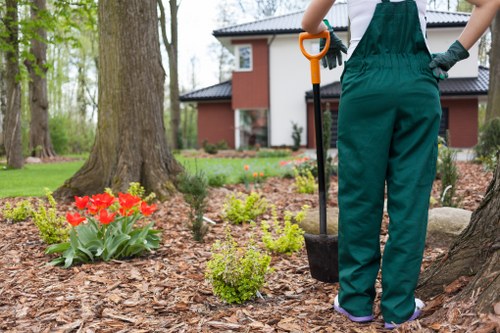
Protecting Plants from Frost
Winter can be harsh on gardens, especially in urban areas like Fitzrovia. Protecting your plants from frost and harsh weather conditions is essential for their survival.
Winter protection tips:
- Covering: Use frost blankets or burlap to cover sensitive plants during cold nights.
- Pruning: Trim dead or damaged branches to prevent breakage from snow and ice.
- Watering: Ensure plants are well-hydrated before the ground freezes to help them withstand the winter.
Taking these precautions will help your garden emerge healthy and vibrant in the spring.
Year-Round Garden Maintenance Tips
Regular Weeding
Weeds can quickly take over a garden, competing with your plants for nutrients and water. Regular weeding is crucial for maintaining a healthy garden.
Effective weeding strategies:
- Consistent Effort: Dedicate time each week to remove weeds before they become established.
- Proper Tools: Use quality gardening tools to make weeding easier and more efficient.
- Mulching: Apply mulch to suppress weed growth and retain soil moisture.
By staying on top of weed control, you ensure your garden remains the focal point of your outdoor space.
Pest and Disease Management
Identifying Common Pests
Pests can pose a significant threat to garden health. Identifying and managing common pests is essential for successful garden maintenance in Fitzrovia.
Common garden pests include:
- Aphids: Small insects that suck plant sap, leading to weakened plants.
- Slug and Snails: Mollusks that feed on leaves and stems, particularly in damp conditions.
- Slugs and Snails: Mollusks that feed on leaves and stems, particularly in damp conditions.
Implement integrated pest management (IPM) techniques, such as introducing beneficial insects and using organic treatments, to keep pest populations under control.
Choosing the Right Plants for Fitzrovia

Native and Hardy Plants
Selecting plants that are native or well-suited to Fitzrovia's climate can significantly reduce maintenance efforts and increase garden resilience.
Benefits of choosing native plants:
- Adapted to Local Conditions: Native plants are naturally adapted to the local climate, reducing the need for excessive watering and care.
- Supports Local Wildlife: These plants provide essential habitat and food sources for local pollinators and other wildlife.
- Disease Resistance: Native species are generally more resistant to local pests and diseases.
Incorporate a mix of native and hardy plants to create a sustainable and low-maintenance garden.
Soil Health and Fertility
Amending Soil for Optimal Growth
Healthy soil is the foundation of a thriving garden. Regularly amending your soil ensures that your plants receive the necessary nutrients for growth.
Soil improvement techniques:
- Composting: Add compost to enrich the soil with organic matter and improve its structure.
- pH Testing: Test and adjust the soil pH to suit the specific needs of your plants.
- Crop Rotation: Rotate plant families each season to prevent nutrient depletion and reduce pest buildup.
Maintaining soil health not only supports plant growth but also enhances the overall ecosystem of your garden.
Pruning and Trimming Techniques
Maintaining Plant Health
Pruning and trimming are essential practices in garden maintenance. They help maintain plant shape, encourage growth, and prevent disease.
Effective pruning tips:
- Timing: Prune at the right time of year, typically during the dormant season for most plants.
- Technique: Use sharp, clean tools to make precise cuts and avoid damaging the plant.
- Removal: Remove dead, diseased, or crossing branches to improve air circulation and sunlight exposure.
Regular pruning promotes a healthy and aesthetically pleasing garden.
Lawn Care in Fitzrovia

Mowing and Edging
A well-maintained lawn enhances the overall appearance of your garden. Proper mowing and edging techniques are crucial for lawn health.
Lawn maintenance practices:
- Regular Mowing: Keep the grass at an optimal height to promote healthy growth and prevent weed invasion.
- Edging: Define lawn borders to create a clean and polished look.
- Fertilizing: Apply appropriate fertilizers to provide essential nutrients and promote lush growth.
Consistent lawn care ensures a vibrant and resilient turf throughout the year.
Hardscaping and Garden Structures
Enhancing Your Garden’s Functionality
Incorporating hardscaping elements like patios, walkways, and garden structures can add both functionality and aesthetic appeal to your garden.
Popular hardscaping features:
- Patios: Create outdoor living spaces for relaxation and entertainment.
- Walkways: Design pathways to guide visitors through your garden.
- Arbors and Pergolas: Provide shade and support climbing plants, adding vertical interest to your space.
Integrating these structures can transform your garden into a functional and beautiful outdoor haven.
Sustainable Gardening Practices

Eco-Friendly Maintenance Techniques
Adopting sustainable gardening practices not only benefits the environment but also promotes a healthier and more resilient garden.
Key sustainable practices:
- Rainwater Harvesting: Collect and use rainwater for irrigation, reducing water consumption.
- Organic Fertilizers: Use natural fertilizers like compost and manure to nourish your plants without harmful chemicals.
- Native Plant Selection: Choose plants that are well-adapted to the local climate, requiring less water and maintenance.
Implementing these eco-friendly techniques ensures your garden is both beautiful and sustainable.
Choosing Professional Garden Maintenance Services

Benefits of Hiring Experts
While DIY gardening is rewarding, hiring professional garden maintenance services in Fitzrovia can save you time and ensure optimal results.
Advantages of professional services:
- Expertise: Professionals bring specialized knowledge and experience to handle various gardening challenges.
- Time-Saving: Outsourcing maintenance tasks allows you to focus on other priorities while ensuring your garden remains well-kept.
- Customized Care: Services can be tailored to meet the specific needs of your garden, enhancing its beauty and health.
Investing in professional maintenance services can elevate your garden's appearance and longevity.
Conclusion
Maintaining a Beautiful Garden in Fitzrovia
Effective garden maintenance in Fitzrovia involves a combination of seasonal care, sustainable practices, and sometimes professional assistance. By following the tips outlined in this article, you can ensure your garden remains a stunning and vibrant part of your home.
Ready to transform your garden? Contact us today to book your garden maintenance service and experience the difference professional care can make.

